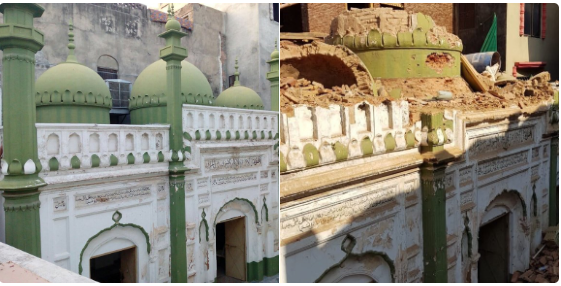
Issue
Sialkot: On 23 May 2018, a large violent mob attacked and destroyed a local Ahmadi home and historical Mosque dating over a century old.
At 10.45pm a large mob of around 35 workers of the Municipal Committee (local authority) of Sialkot attacked a local house belonging to a member of the Ahmadiyya Muslim Community. Workers raided the home where they started to demolish the property from the upper floor, working their way down. The property was targeted due to its historical significance and links to the founder of the Ahmadiyya Muslim Community.
As events progressed, additional violent extremists rushed to join the attack. The group shouted anti- Ahmadi slogans and violently called for the slaughter and persecution of all Ahmadi citizens in Pakistan.
Mubarak Mosque, located opposite the property was also attacked. Extremists took to the roof of the Mosque where they demolished its magnificent dome and minarets and attacked the rest of the Mosque reducing it to rubble. The destruction of the Mosque was supported by approximately 600 bystanders who encouraged and cheered their actions.
The attacks were instigated by Cleric Hafiz Hamid Raza who can be heard in footage of the attack inciting the destruction of the Mosque. Hamid Raza was the keynote speaker at the Khatme Nabuwat conference in 2014 in Derby UK.
It was claimed that the attacks took place due to ‘illegal renovations’ however, full and proper permissions were obtained from the local authority to carry out works to both properties involved in the incident. The frenzied mob continued demolishing both properties until the early hours of the morning at around 4.30am.
The Governor of Punjab, Shahbaz Shareef has presented a certificate of achievement and a cheque of 100,000 rupees as a reward to the commissioner of Sialkot for coordinating the attacks against the Community.
Following the attack, extremist cleric, Dr Khadim Hussain Khursheed Alazhari has called on the commissioner to orchestrate similar attacks on all other buildings belonging to the Community in Sialkot.
Background to the Attack
The attacks were ignited by local Government officials of the Tehsil Municipal Administration. A week prior to the attack, Mr Hamid Raza – a prominent leader of the administration, incited barbaric plans to demolish the Mosque and encouraged his followers to swear an oath of allegiance to such an attack against the Ahmadiyya Muslim Community. In response to his speech, two policemen were appointed to protect the buildings. On the night of the attack the policemen were not present and had left the locality in a coordinated attack by the local authority.
Following the attack, Mr Hamid Raza stated:
“I want to thank the Sialkot Administration, the DPO (District Police Officer) the DC (District Commissioner) and the TMA (Town Municipal Corporation) from the bottom of my heart because as Muslims it was your responsibility to do this.”
Actions of the local authority were supported by the Sialkot lawyers association who submitted a requisition to take urgent action against historical buildings relating to the founder of the Ahmadiyya Muslim Community, Hazrat Mirza Ghulam Ahmad, as they claimed that buildings of this nature “hurt the sentiments of the Muslims”.
British Members of Parliament Condemn Attack
On 24 May 2018, Members of Parliament condemned the Sialkot attack during a Housing of Commons debate:
Siobhain McDonagh MP
“Only this morning, I awoke to terrifying reports of an attack by extremists on an Ahmadi house and mosque in Sialkot last night, with mob leaders calling for this to happen to all Ahmadi mosques. The situation could not be more precarious, for an Ahmadi in Pakistan faces widespread hatred from the moment they are born to the moment they die”.
Paul Scully MP
“Local administrators, police and journalists were all at the scene when it was going on, but they were powerless to do anything other than stand by as spectators while people ran around and continued unabashed with the destruction of the Ahmadiyya property”.
1;www.facebook.com/1773161939641456/videos/1933458956945086: httpsVideo of cleric Khadim Hussain Khursheed Alazhari following the aftermath of the attack.
2https://uk.reuters.com/article/uk-pakistan-ahmadis/pakistani-mob-destroys-100-year-old-minority-ahmadi-mosque-idUKKCN1IP20V
3https://hansard.parliament.uk/Commons/2018-05-24/debates/B2B8FC6E-7F7F-4BFC-8C7A-107F94D1B9FB/AhmadiyyaMuslims
4 ibid


